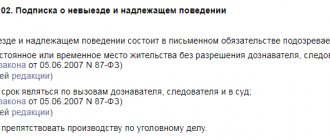The question of increasing alimony payments most often worries the recipient of alimony. It is he who has to worry about ensuring that the child (or he himself, being disabled) does not experience need and has at least the bare minimum for normal life.
Therefore, it is the alimony recipient who often initiates an increase in alimony, trying to reach an agreement with the payer or going to court.
The alimony payer is also able to initiate an increase in alimony at his own discretion, if he is sure that as a result he will be able to provide everything necessary for himself and his former family.
The law does not prohibit, but even provides for an increase in alimony payments if the financial and family situation of the parties allows or there are other circumstances conducive to this. This is stated in the second part of Article 81 of the Family Code of the Russian Federation and in the Federal Law “On Enforcement Proceedings”.
Grounds for increasing the amount of alimony
The reasons for increasing the amount of alimony are not established by law. With the exception of Art. 119 of the RF IC, which states that the basis may be a change in the financial situation of the claimant or payer.
Grounds for changing the amount of alimony:
- significant deterioration in financial situation;
- the need for additional expenses for a child;
- dismissal from employment;
- pregnant women and those raising children under 3 years of age can collect alimony for themselves;
- an increase in the payer’s earnings (if alimony was assigned as a share of the salary, its amount will increase, which cannot be said about fixed amounts - they will remain unchanged);
- death of relatives who helped mother and child;
- the need for expensive treatment for the ex-wife, and therefore there is not enough money for children.
Important! The increase in alimony occurs automatically due to indexation based on Art. 117 RF IC. It is carried out by an accountant at the payer’s place of work. When concluding an alimony agreement, the specifics of indexation are prescribed in it, but in the absence of relevant clauses, one should be guided by the provisions of Art. 117 RF IC.
Is it possible to increase the child benefit and on what grounds?
The Family Code of the Russian Federation (FC RF) determines the rights and responsibilities of parents regarding the maintenance of their minor children. Article 81 of the RF IC specifies the size of the shares of income that are awarded to the recipient of alimony (how many percent of income is alimony is described here).
Important! Paragraph 2 of Article 81 states that the court, under certain circumstances, may decide to change the amount of alimony up or down.
Over time, the assigned amount of child support may not be enough to meet all the child's needs. The reasons for the lack of funds may include:
- inflation;
- rising prices and increasing needs of the child with age;
- the occurrence of additional expenses for the maintenance of the child;
- decrease in the recipient's income level and other reasons.
If the recipient of alimony is experiencing a shortage of funds and the budget is not enough to provide everything the child needs, he has the right to go to court with a request to increase the amount of payments.
Reasons for increasing the amount of payments may include:
- A decrease in the recipient's earnings, for example, due to a change in salary level or his dismissal.
- Increase in the cost of the consumer basket.
- The recipient of payments has health problems, which requires significant expenditures from the budget, which leads to a lack of funds to support the child.
- Child health problems that require long-term and expensive treatment.
- The birth of another child to the alimony recipient, or the appearance of another family member, for example, an elderly parent who requires care and financial support.
In addition, certain changes in the life of the payer, which the other side of the case knows about, may also be grounds for increasing payments:
- termination of any obligations to support another person, which the alimony payer was previously obliged to fulfill;
- increase in wages.
Reference. The court may consider any other circumstances that indicate that the payer has the opportunity to make alimony payments in a larger amount.
If a child support agreement has been concluded between the mother and father of the child, then they can increase payments by agreeing among themselves to change the amount of payments. New terms must be included in the contract and notarized.
From the video you will learn what are the grounds for increasing alimony:
How to draw up a claim correctly?
There is no unified form for the statement of claim, but when filling it out, it is necessary to take into account the rules of the Code of Civil Procedure of the Russian Federation regarding the content.
It should include the following information:
- name of the court;
- Full name, registration addresses of the plaintiff and defendant;
- when and by whom the previous decision to collect alimony was made;
- details of the decision;
- FULL NAME. child, series and number of the child's birth certificate;
- passport details of the plaintiff;
- link to article 119 of the RF IC, according to which, if the financial situation changes, the plaintiff may petition for an increase in payments;
- claims: to collect and increase alimony, an indication of the amount is required;
- a list of attached documents.
At the end there is a date of compilation and a signature. The plaintiff may also indicate the recovery of his legal costs from the defendant as a requirement.
If, when collecting alimony for a minor child, proof of the need to collect alimony is not required, then when the amount increases, the responsibility to substantiate the claim falls on the plaintiff. The applicant must explain in detail why the court should make the relevant decision. If the claim does not contain evidence, the court will refuse to satisfy the claim.
The following can be presented as evidence:
- information about the increase in the payer’s income;
- data on inflated expenses of the alimony provider (purchase of expensive real estate, foreign vacation);
- photos from social networks about expensive pastimes;
- information about the availability of additional income.
The information must be supported by documents or testimony of witnesses.
Sample application to increase alimony from 1/6 to 1/4
Sample application to bailiffs for the calculation of alimony arrears
Exemption from alimony payments and preparation of a statement of claim
Which alimony payments can be increased and which ones cannot?
By virtue of the law, an increase in alimony is allowed, provided that previously it was paid in a fixed amount. When payments are ordered by a court decision, a separate claim should be filed to review them.
If there is an agreement on alimony, the necessary adjustments are made to it. They must also be certified by a notary.
Expert commentary
Roslyakov Oleg Vladimirovich
Lawyer, specialization civil law. More than 19 years of experience.
In a situation where the court has decided to collect alimony as a percentage of the debtor’s income, it will not be possible to increase the amount. However, it is possible to allow a change in the order of making deductions: from interest to a fixed payment. This also requires a new lawsuit.
The procedure for filing a claim to increase the amount of alimony
To increase payments, the plaintiff is recommended to act according to the instructions:
- Prepare documents indicating the child support provider’s ability to pay more. These can be salary certificates, extracts from medical institutions, 2-NDFL from the payer’s place of work.
- File a claim.
- File a claim with documents in court at the place of registration of the defendant. If it is unknown, everything is sent to the plaintiff’s registered address.
- Attend court hearings. The first hearing is scheduled 10 days after the application is registered.
- Get a court decision. If it is negative and has not entered into legal force, an appeal is made through the appellate procedure. Decisions that have entered into force are appealed through the cassation procedure.
- Apply with an extract from the court decision and a writ of execution to the bailiffs if proceedings have been initiated against the payer. For recovery through the employer, the IL is submitted to the accounting department at the place of work, and deductions are made according to new calculations.
There are situations when a woman, instead of increasing the amount of alimony, can apply for additional payments - they are specified in Art. 86 RF IC. You can receive additional funds (compensation) for expenses already incurred or for future expenses if your child needs expensive medications, treatment, or paid ongoing care after a serious injury or illness.
Sample application for the collection of additional alimony:
More details on the grounds for collecting additional payments can be found here.
Documents attached to the claim
When filing a claim, you must provide:
- passport;
- children's birth certificates;
- receipt of payment of state duty;
- salary certificate;
- certificate 2-NDFL;
- certificate of family composition;
- agreement on payment of alimony.
The last document is provided if it was previously issued by a notary. The secretary makes copies of the entire list and gives the originals to the plaintiff.
Payment of state duty
According to Art. 333.36 of the Tax Code of the Russian Federation, plaintiffs in cases of collection, increase or decrease in the amount of alimony are exempt from paying state duty. However, it will still have to be paid, but by the defendant. The demand for payment must be reflected in the statement of claim.
The state duty is 300 rubles.
Application processing time
According to Art. 154 of the Code of Civil Procedure of the Russian Federation, claims for the collection of alimony are considered within 1 month. Next, a court decision is made, on the basis of which the plaintiff and bailiffs act.
Time limit for the court decision to enter into legal force
According to Art. 209 of the Code of Civil Procedure of the Russian Federation, the court decision comes into force within a month after registration, unless otherwise stated in it. This time is given for an appeal. If the deadline is missed, a cassation appeal is filed - it can be considered not only at hearings, but also in the judge’s office without scheduling a hearing.
Indexing as a basis
To ensure that the amount of alimony does not naturally decrease with an increase in consumer prices, the legislation provides for indexation of payments. The RF IC regulates this issue under Art. 117.
Indexation concerns alimony paid in the form of fixed payments , since their calculation is based on the cost of living in the region of residence.
If payments are written off from the alimony payer as a share of income, then the amount of alimony will increase simultaneously with the growth of his earnings.
When considering a claim for the recovery of alimony in a fixed sum of money, the court makes a decision on the amount of payments, based on the cost of living in the region, and if this indicator is not established, then the cost of living for the country as a whole is taken as a basis (about what to do if alimony below the subsistence level, written here).
The cost of living changes once a quarter, which means indexation of alimony payments must be carried out every quarter.
Important! Indexation is carried out only if the cost of living increases. If this indicator falls, then alimony payments remain at the same level.
In accordance with Art. 117 of the RF IC, indexation of alimony can be carried out by:
- employer of the alimony payer;
- bailiff
If payments are made under an alimony agreement, then, as a rule, there is a clause on the indexation of payments. If this point is not specified in the contract, then indexation will be carried out in proportion to the cost of living in force in the region or in the country as a whole.
If the voluntary alimony agreement does not contain a clause on indexation of payments, and the parties cannot come to a common decision, then the issue of changing the amount of payments is resolved in court.
Reasons for refusing to accept an application
It should be remembered that the acceptance of a claim and a negative decision on it are two different things. A claimant may be refused admission when:
- an incomplete list of documents has been provided;
- there are no grounds for increasing payments;
- The submitted documents do not correspond to state standards.
A negative decision can be made for reasons: deterioration of solvency, financial problems or the normal financial situation of the plaintiff.
Which court should I go to?
In order to achieve an increase in the amount of payments, you can seek help from a magistrate. In Part 3 of Art. 29 of the Code of Civil Procedure of the Russian Federation states that such a claim can be brought both at the place of residence of the plaintiff and at the address of the payer.
The name of a specific justice of the peace may not be indicated in the claim. Just write in the header “To the magistrate for _____ precinct.”
Specific details of the magistrate's court can be easily found on the Internet, depending on the locality and street name. All materials for the magistrate can be submitted either through the office or sent by mail.
Appealing a court decision
If one of the parties does not agree with the decision, it can be appealed within a month by filing an appeal, and later only through a cassation appeal.
The appeal is submitted to a higher judicial authority. For example, if a decision is made by a magistrate's court, an appeal is made to the district court.
Procedure:
- The interested party files an appeal.
- The court receives the appeal and notifies all parties to the proceedings, including the defendant in this case.
- The defendant has the right to file an objection. If it is reasoned, the court will take it into account.
- The judicial authority issues an appeal decision. If it changes or cancels the terms of the first decision, it enters into legal force on the day of execution.
Filing a claim to increase the amount of alimony is available to both parties – the payer and the recipient. You can increase the amount of payments by drawing up an alimony agreement, and if there are disputes, only in court.
Methods of paying alimony: legislative framework
The main regulatory document is the Russian Family Code.
It specifies the types of maintenance, the procedure for payment or forced collection, including alimony for a wife on maternity leave.
If the debtor has a stable income, then monthly deductions are made from him as a percentage.
At the same time, child support as a percentage directly depends on the number of minors in need of maintenance.
The amount of payments from income established by Art. 81 IC RF :
- for one child – a quarter of 25%,
- on two – a third 33%,
- for three or more – half 50%.
When the debtor does not have a stable means of livelihood, alimony is awarded in a fixed amount. The legislation does not establish any specific lower limit. At the same time, the courts link payments to the minimum subsistence level in the relevant region.
The child's parents have the opportunity to sign an agreement between themselves regarding the payment of child support. It must be certified by a notary. Article 104 of the RF IC provides for additional methods of making payments.
The agreement can even stipulate marital alimony in a fixed amount, periodically and at a time. Sometimes paying the entire amount is beneficial for both the payer and the recipient (payment for treatment or education of a child).
Expert commentary
Roslyakov Oleg Vladimirovich
Lawyer, specialization civil law. More than 19 years of experience.
The contract may also stipulate the provision of property as payment. For example, a father transfers a car or real estate to a child. Combined schemes (money + property) are not prohibited.
Attachments to the claim
The application will not be considered without attachments justifying its submission. The list includes documents:
- copies of claims according to the number of parties involved in the process;
- receipt of payment of state duty;
- applicant's passport;
- a document confirming the right of a family member (child, parent) to receive alimony;
- a document providing the basis for payment of alimony: an agreement, a court order, a court decision, that is, a writ of execution with information about the previous amount of payments;
- copies of documents confirming receipt of penalties;
- documents confirming the reasons for the need to increase alimony: a certificate of health, a change in family composition, admission to an educational institution on a paid basis, checks indicating the cost of medications for health improvement and other evidence.
If the required documents are not available, the applicant will be given time to collect data.
Arbitrage practice
As judicial practice shows, the judge usually sides with the mother and child and makes a positive decision. It may not always correspond to the amount that the plaintiff expected, but the increase process will still affect the amount of payments. But you must also approach the filing of the application responsibly and collect the necessary evidence forcing you to demand an increase in the amount of alimony from the court. If all the rules are followed, then the probability of a positive outcome is up to 80%. But we should not forget about the financial side of the payer. If the defendant officially receives a small salary or is disabled, and the amount you expect to increase it is unaffordable for the father, then it is quite difficult to count on a satisfactory outcome, and the judge cannot make decisions violating the rights of the other party.
You should also understand that when increasing the amount of alimony, you cannot immediately count on double or triple the amount of payments compared to the previous one. For example, if you previously received 0.6 minimum wage, then after review the judge may assign 1 minimum wage. If you disagree with the decision or refusal (Article 134 of the Code of Civil Procedure of the Russian Federation) of your appeal, you can appeal it to a higher authority or, after some time, file a second claim. However, repeated application is possible in the presence of newly arisen circumstances, and the collection of alimony does not have a statute of limitations.
Thus, in order to go to court to increase the amount of alimony, you must have grounds. They must be correctly stated in your statement of claim and supported by evidence. This is the only way to achieve a positive decision and increase the amount of payments for the child.
Special cases
In practice, sometimes situations occur when the second parent raising a child wants to increase the amount of alimony, having discovered the fact that the payer receives a gray salary. In addition, cases related to increasing alimony payments made by pensioners and disabled people are sometimes considered.
With a gray salary
Gray wages mean part of the income received, which is not officially taken into account anywhere. Thus, this leads to an underestimation of the amount of child support paid.
In such a situation, the second party (recipient of funds) will need to prove in court that there is a gray earnings scheme. To do this, the plaintiff can submit an application in advance to the tax authority to conduct an audit against the alimony payer.
If the alimony worker is a pensioner or disabled
It is quite difficult to achieve an increase in payments from a pensioner or disabled person , since it is believed that this category of the population also needs financial support. In this regard, an alternative option may be to put forward a demand for the recovery of additional expenses associated with the maintenance of a common child.
Thus, current legislation does not prohibit increasing the amount of alimony payments. This can be done in court or by drawing up an agreement. Having chosen the first option, the applicant needs to worry about collecting facts confirming the need to increase the allowance for the child.










